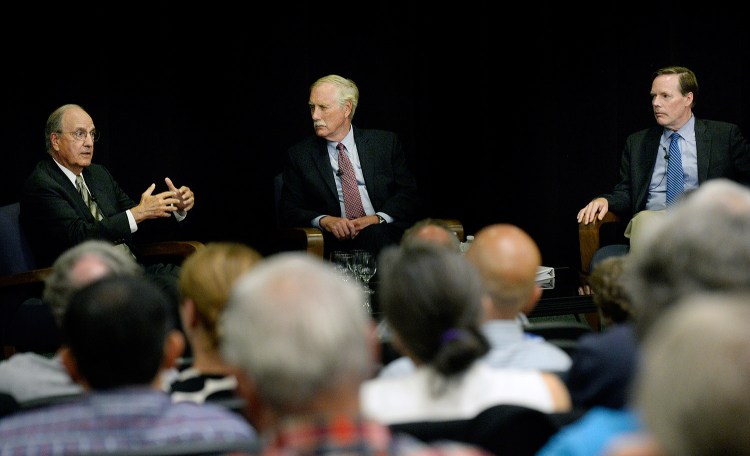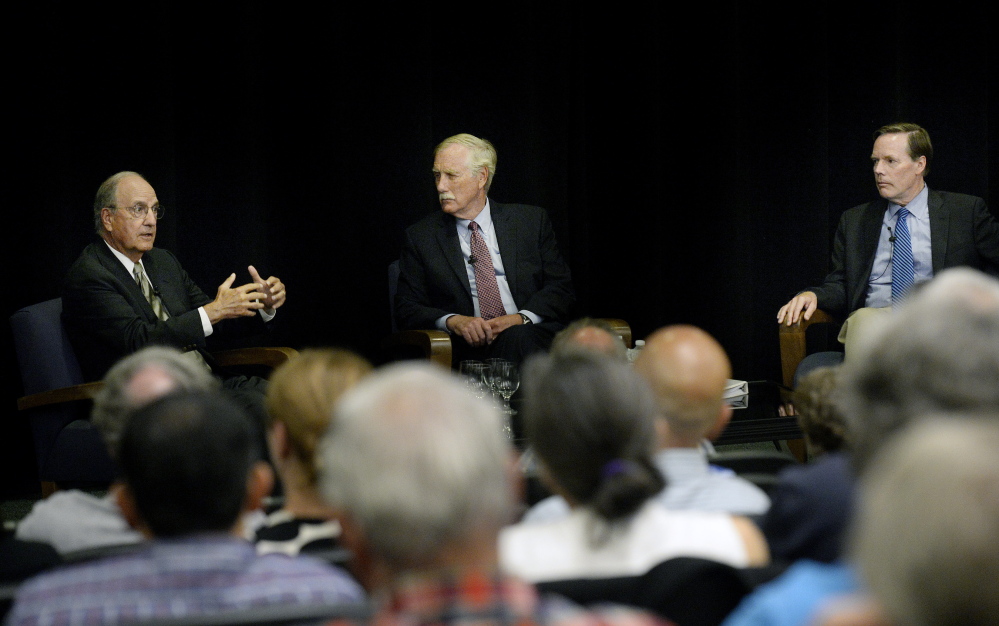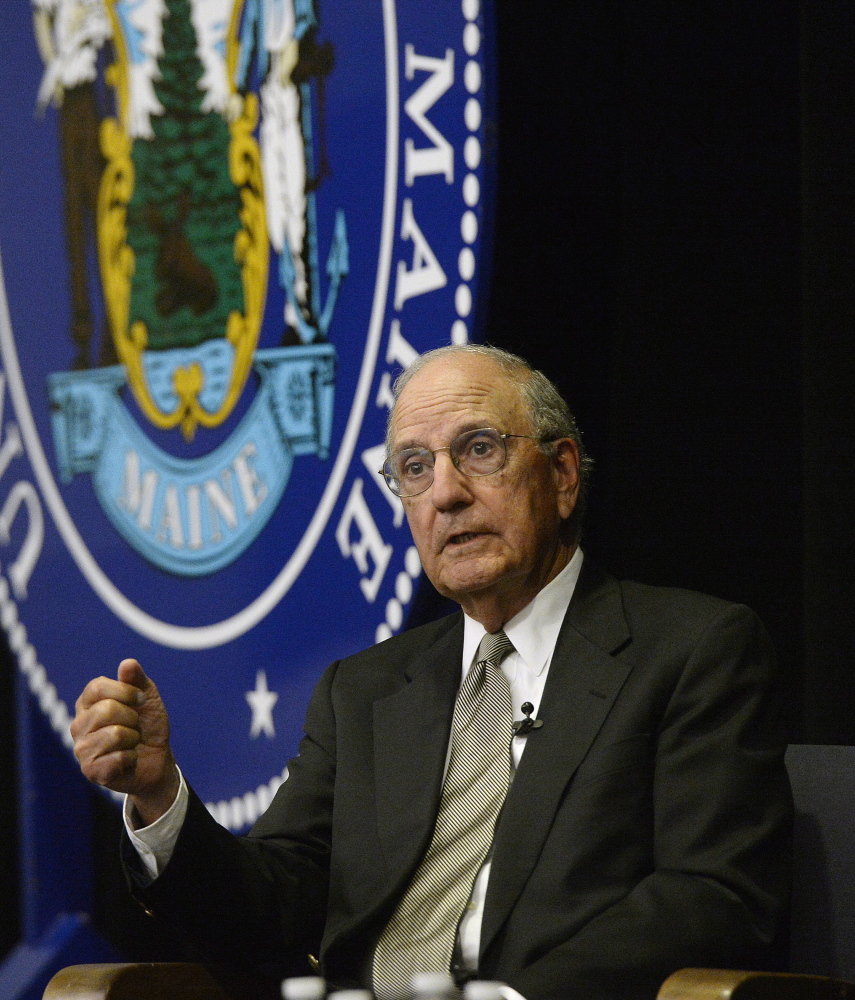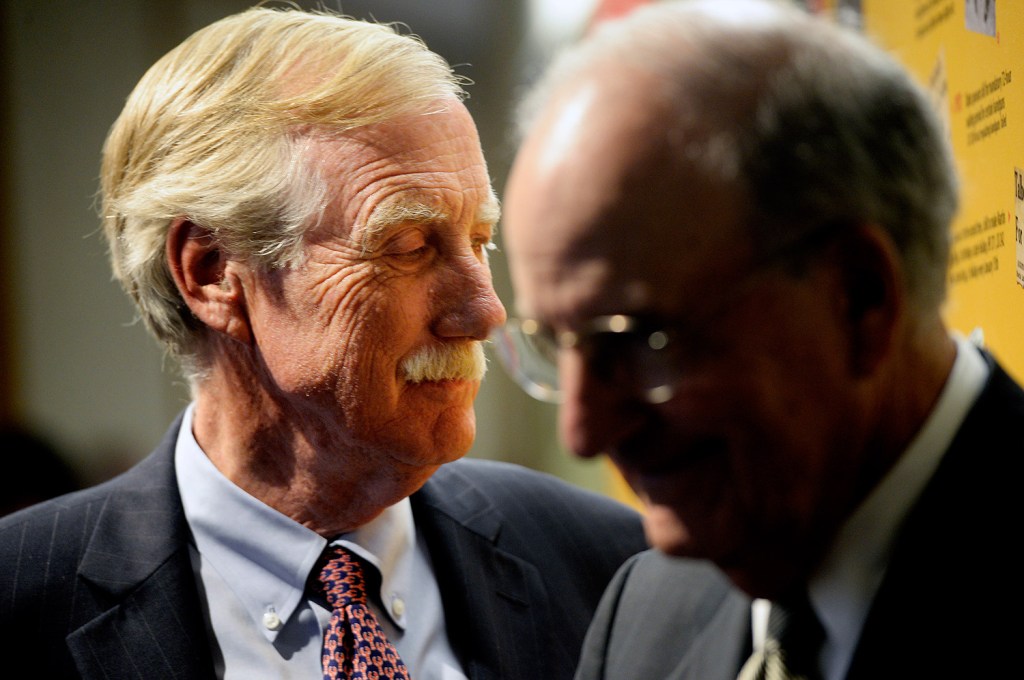U.S. Sen. Angus King said Wednesday that his support for a controversial deal designed to limit Iran’s nuclear program and prevent the longtime American antagonist from obtaining a nuclear weapon is the most difficult decision he’s made in nearly a decade of public service.
However, King said, the alternatives – up to and including war – are far worse. While he was critical of President Barack Obama’s assertion that the choice was to either accept the deal or prepare for war, he said conflict was a real possibility.
“If we bomb them … are they going to want to negotiate with us two or three years later?” King said.
King, now in the third year of his first six-year term, made his case for the deal before an overflow audience of over 250 people at the Talbot Lecture Hall at the University of Southern Maine. The Brunswick resident and member of the Senate Committee on Armed Services and the Committee on Intelligence was accompanied by former U.S. Sen. George Mitchell and former U.S. Ambassador Nicholas Burns, both of whom support for the deal. All three argued that rejecting the accord would likely mean that the current multinational sanctions that have crippled Iran would erode, thereby economically strengthening the country if it covertly pursued a nuclear weapon. The deal, they said, provided a rigorous inspection program that will make obtaining a nuclear weapon more difficult.
“The multination sanctions will lapse whether the deal is accepted or not,” said Mitchell, adding that Russia and China already have signaled that they will allow their sanctions against Iran to expire. Russia and China are among the six countries that sided with the U.S. to reach the Iran accord.
The event was part of King’s public outreach effort to explain his upcoming vote on a Republican-led resolution to reject the deal. The Iran agreement, announced by the Obama administration July 14, has become a focal point on Capitol Hill and will likely be one of the leading debates after Labor Day when Congress returns from its August recess. King is one of several senators who returned to their home states to explain their position on the highly divisive deal. Supporters say the agreement will prevent Iran from obtaining a nuclear weapon for at least 15 years, but opponents decry it as a fundamental shift in the U.S. policy of halting nuclear proliferation.
Republicans, who control the House and the Senate, have scheduled a vote on a disapproval resolution for mid-September. Obama has said that he’ll veto the resolution if it passes, setting the stage for a veto override vote in which King and several other senators could play key roles.
Obama would need 34 votes in the Senate to sustain his veto. The administration has expressed confidence that it has the votes to sustain his veto in the House.
So far, 23 of 44 Senate Democrats have expressed support for the deal. However, two Democrats, Sen. Chuck Schumer of New York, the presumptive leader of the Democratic caucus following the 2016 election, and Sen. Robert Menendez of New Jersey, the former chairman and current member of the Senate Committee on Foreign Relations, have said that they’ll vote against the accord.
Menendez has been particularly critical of the deal. On Tuesday, in a speech at Seton Hall University, he said the Iran accord would hurt U.S. national security interests by trading its long held policy of halting nuclear proliferation for one that attempted to manage it. He described the issue as “one of the most serious national security, nuclear nonproliferation, arms control issues of our time” and quickly challenged Iran’s need for a nuclear program.
“Why does Iran – which has the world’s fourth largest proven oil reserves, with 157 billion barrels of crude oil and the world’s second largest proven natural gas reserves with 1,193 trillion cubic feet of natural gas – need nuclear power for domestic energy?” he said, according to a transcript of his speech.
Menendez added that his position wasn’t akin to Republicans’ reflexive opposition to the president and his policy agenda, but reflected his concerns about Iran’s intentions.
“We know that despite the fact that Iran claims their nuclear program is for peaceful purposes, they have violated the international will, as expressed by various U.N. Security Council Resolutions, and by deceit, deception and delay advanced their program to the point of being a threshold nuclear state,” he said.
Rep. Chellie Pingree, D-Maine, has said that she’ll back the deal. Rep. Bruce Poliquin, R-Maine, has signaled that he’s opposed to the accord. Sen. Susan Collins, R-Maine, expressed concern in a July 14 statement that the deal appeared “to delay, rather than dismantle, Iran’s capabilities toward becoming a nuclear-armed state.”
Burns, the former ambassador who also served as Under Secretary of State for Political Affairs under President George W. Bush from 2005 to 2008 and was the lead U.S. negotiator on Iran’s nuclear program during that time, said that the deal isn’t perfect. However, the Obama administration received more than he expected. He said the strength of the deal is that it stops Iran from obtaining nuclear weapons for at least 15 years. The weakness, he said, is that it’s time-limited.
Burns also noted that Iran has lied about its nuclear program before. He described the country as one that is seeking to increase its influence in the turbulent Middle East, intervening in conflicts and sponsoring the terrorism group Hamas in its struggle against Israel.
If the deal is ratified, he said, the U.S. should make it clear to Iran that it will use force if it develops nuclear arms.
“The Iranians are not 10 feet tall. We are,” he said.
Critics of the deal, including Poliquin, were spurred by revelations Wednesday that Iran and the International Atomic Energy Agency had reached a separate agreement that will allow the country to use its own experts to inspect the Parchin nuclear facility it allegedly used to develop nuclear arms. The secret deal, reported by the Associated Press, is reportedly linked to an investigation into past allegations that Iran covertly sought to develop atomic weapons. According to the AP, the inspection deal is a separate, side agreement worked out between the IAEA and Iran. The United States and the five other world powers that signed the Iran accord are reportedly not part of the agreement, but have endorsed it as part of the larger accord.
“Allowing Iran to police the Parchin nuclear site themselves is beyond troubling and completely unacceptable,” Poliquin said in a statement. “As the leading state sponsor of terrorism, Iran has proven they cannot be trusted and in under no circumstances should they be policing their own sites.”
As part of the overall deal, Iran has agreed to allow the IAEA greater access to inspect its nuclear program. Additionally, the agency will be allowed to investigate suspicious sites or explore allegations of covert facilities designed to enrich uranium into weapons-grade plutonium – the critical component of a nuclear bomb.
The accord also requires Iran to decrease its current stockpile of uranium while limiting the capacity to create enriched uranium for 15 years. According to the Obama administration, a rigorous inspection regimen will remain in place for as long as 25 years.
Critics of the deal say it lifts economic sanctions that have crippled Iran’s economy and that it stops well short of the administration’s previous goal of totally dismantling the country’s nuclear program.
Mitchell said the president’s critics “tend to compare the deal to a perfect accord” when a perfect deal wasn’t possible.
He also addressed critics who note that Israel, a longtime ally of the U.S., opposes the deal.
“It’s our national self interest that should dictate our decision,” he said. “We should decide – taking all of our commitments to our friends in account – is this the best thing for the United States of America? If that standard is applied, a fairly objective conclusion is inescapable: This agreement is in our national interest.”
Send questions/comments to the editors.






Success. Please wait for the page to reload. If the page does not reload within 5 seconds, please refresh the page.
Enter your email and password to access comments.
Hi, to comment on stories you must . This profile is in addition to your subscription and website login.
Already have a commenting profile? .
Invalid username/password.
Please check your email to confirm and complete your registration.
Only subscribers are eligible to post comments. Please subscribe or login first for digital access. Here’s why.
Use the form below to reset your password. When you've submitted your account email, we will send an email with a reset code.